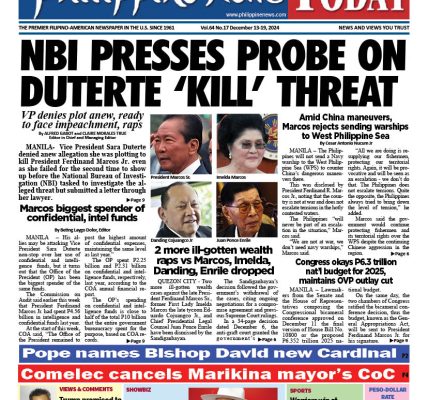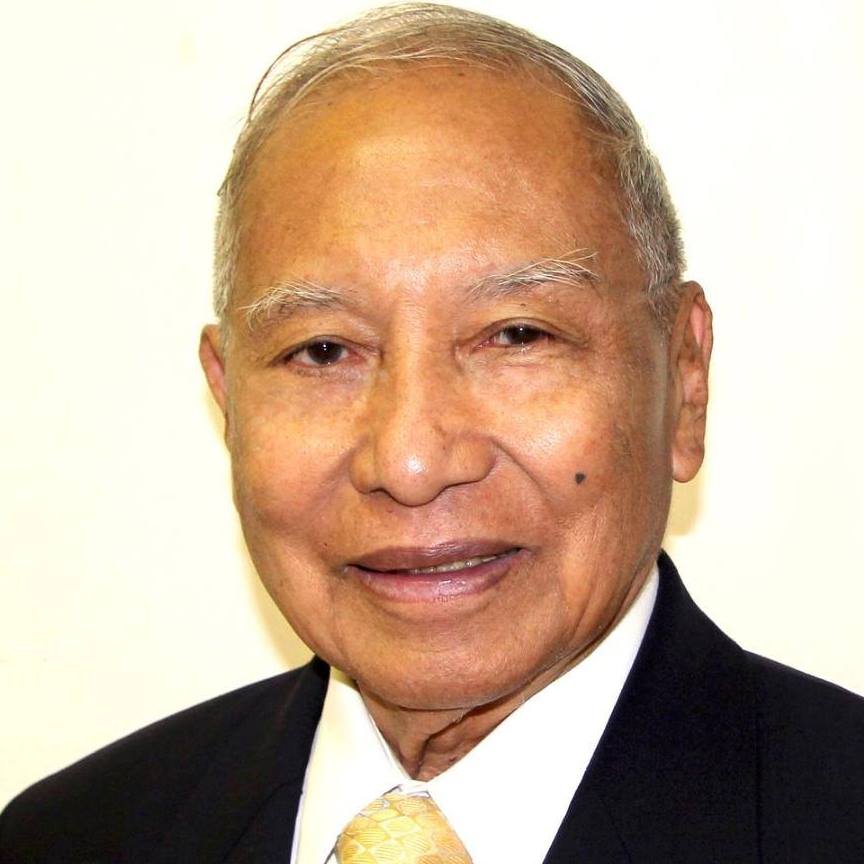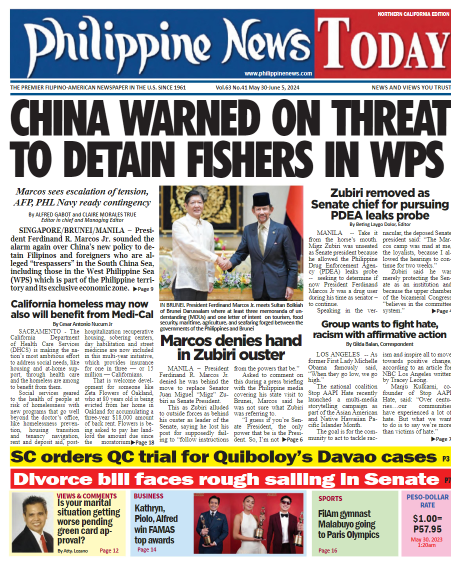WEST PHL SEA: IT’S MISCALCULATION AWAY FROM ‘WAR;’ China attacks PHL ships, plane again; US Indo-Pacific Command chief offers escorts
MANILA/WASHINGTON – Tensions intensified further in West Philippine Sea and South China Sea as Philippine vessels were “attacked” again and a government plane were targeted with flares while on patrol and supply mission in the area, triggering an offer from the United States Pacific Command to escort the Philippine vessels and airplanes as experts see an armed conflict or possible war with miscalculation by the parties.
Defense Secretary Gilberto Teodoro branded China, with its dangerous and aggressive maneuvers, as the “biggest disruptor” of peace in Southeast Asia at a conference of the US Indo-Pacific Command in Manila.
Admiral Samuel Paparo, head of US Indo-Pacific Command, interviewed at the 35th Annual International Military Law and Operations Conference in the Philippines, said that it was “an entirely reasonable option” that the US could send ships to escort Philippine vessels on resupply missions.
Paparo noted that “escort of one vessel to the other is an entirely reasonable option within our Mutual Defense Treaty” with the Philippines, which was signed in 1951 and explicitly states that both nations will come to the others’ aid should they be attacked.
This as the National Maritime Council (NMC) believes it is about time the Philippines and the United States (US) review their over seven-decades-old Mutual Defense Treaty (MDT) to make it more responsive to the modern security landscape. The MDT, signed in 1951, provides that the Philippines and the US would support each other if attacked by an external party, according to NMC spokesperson Alexander Lopez.
Teodoro earlier said the interpretation of the MDT, especially the provision regarding an armed attack, must be tailored and broadened for it to become more responsive to China’s illegal activities in the West Philippine Sea (WPS).
In Washington, the United States bewailed the latest dangerous actions of the China warships and Coast Guard against Philippine vessels and aircraft.
The act of ramming vessels is not in any way professional and is a violation of the international law to prevent collision at sea, a United States Coast Guard (USCG) official said, chastising the contradiction in China’s statement on its latest actions in the Sabina Shoal.
In a virtual conference, USCG Pacific Area Deputy Commander Rear Admiral Andrew Sugimoto said no law-abiding country which conducts safe and professional operations would ram other ships.
“It’s a little astounding to say that ‘I’m going to break the law in order to uphold the law.’ It just doesn’t make sense, and I think most nations out there see that as unsafe and unprofessional conduct, which only highlights and further emphasizes the bullying that is going on,” he said.
Armed Forces of the Philippines (AFP) chief Gen. Romeo Brawner Jr. said Manila would continue to maintain its presence in Ayungin Shoal, where the BRP Sierra Madre (LS-57) is stationed and manned by Filipino soldiers despite China’s increasing aggression.
Brawner said the country is adopting a three-pronged strategy in dealing with the South China Sea issue.
“First, is that we have to establish our effective and sustainable presence in the WPS. A lot of people have been asking on why we have to insist on being in the Second Thomas Shoal (Ayungin Shoal) with the BRP Sierra Madre and our answer is because we have to assert our sovereignty and our sovereign rights,” he said during the 35th International Military Law and Operations Conference (MILOPS 24) held at the Manila Hotel.
Brawner said the military, the Philippine Coast Guard (PCG), and the Bureau of Fisheries and Aquatic Resources are working together to sustain Manila’s presence in Ayungin Shoal.
He said the continued activities of fisherfolk in the area also contribute to this effort.
“Second is while we are doing these, we are modernizing the AFP, trying to develop that capability in order for us to reach that deterrence (capability) that we want to achieve and third is to develop stronger relations, ties with our allies and partners,” he added.
Japan, South Korea, the European Union and other allies also aired support to the Philippines amidst the conflict with China.
The Japanese Ministry of Foreign Affairs, for one, called for de-escalation in tensions amid China’s latest acts in the West Philippine Sea over the past two weeks, including the deployment of flares and ramming of a Filipino vessel.
Without directly naming any country, the Japan ministry said Japan “steadfastly opposes” the dangerous and coercive use of Coast Guard and maritime militia vessels as well as aircraft.
“Japan expresses serious concern over repeated actions in recent days that increase regional tensions in the South China Sea and urges de-escalation of the tensions,” it said in a statement.
In two separate incidents last week, China fired flares multiple times while a Bureau of Fisheries and Aquatic Resources (BFAR) plane was conducting an air patrol near Scarborough Shoal and the Zamora Reef.
Last Sunday, a Chinese Coast Guard vessel rammed BFAR ship BRP Datu Sanday while it was en route to Sabina Shoal to resupply Filipino fishers with diesel, food, and medical necessities.
Japanese Ambassador Endo Kazuya earlier said this development around Sabina Shoal, which is situated well within the country’s exclusive economic zone, is “unacceptable” and that any action that increases tensions or obstructs the freedom of navigation is “not tolerated”.
In its statement, the Japanese foreign ministry said the issue of the South China Sea is directly related to the region and is a legitimate concern of the international community.
“[T]herefore Japan opposes any unilateral attempts to change the status quo by force as well as any actions that increase tensions in the South China Sea, including obstruction of freedom of navigation and over flight,” it said.
The ministry lauded the Philippines ”for having consistently complied with the Arbitral Tribunal’s award” and for showing its commitment to the peaceful settlement of disputes in the South China Sea.
“The arbitral award is final and legally binding on the parties to the dispute under the provisions of the United Nations Convention on the Law of the Sea (UNCLOS), and Japan strongly hopes that the parties’ compliance with the award will lead to the peaceful settlement of disputes in the South China Sea,” it said.
“Japan has consistently advocated upholding the rule of law at sea and will continue to cooperate with the international community including ASEAN Member States and the United States to protect the free and open international order based on the rule of law,” it added
The China Coast Guard (CCG) deployed a force of 40 ships in Escoda Shoal in the West Philippine Sea (WPS) and blocked two Philippine Coast Guard (PCG) vessels on a resupply mission Monday.
In a statement Tuesday, PCG spokesperson for the WPS Commodore Jay Tarriela said the two PCG vessels – BRP Cabra and BRP Cape Engaño– were on a humanitarian mission to deliver food and supplies to the BRP Teresa Magbanua that was on an extended patrol in Escoda Shoal.
“Unfortunately, during this mission, the People’s Republic of China deployed an excessive force of 40 vessels including six CCG vessels, and three People’s Liberation Army Navy (PLAN) warships, in an attempt to obstruct our lawful humanitarian operation,” Tarriela said.
In addition to the CCG and PLAN vessels, there were 31 Chinese maritime militia vessels in the waters of Escoda Shoal.
“Such actions resulted in our two 44-meter Multi-Role Response Vessels (MRRVs) being unable to safely deliver essential supplies, including a special ice cream treat from the Commandant in honor of National Heroes’ Day,” Tarriela said.
He called on the CCG to “abide with the international law and stop deploying maritime forces that could undermine mutual respect, a universally recognized foundation for responsible and friendly relations among Coast Guards.”
Ealier, US Ambassador MaryKay L. Carlson reiterated Washington DC’s support for the Philippines with the hashtag #FriendsPartnersAllies.
“Unsafe, unlawful, and aggressive conduct by the PRC disrupted a legal Philippine mission, endangering lives — the latest in multiple dangerous actions by the PRC (People’s Republic of China),” she sazid in a poston X.
Meanwhile, Japanese Ambassador Endo Kazuya also posted on X that Tokyo opposes any action that increases tension in WPS and endangers people’s lives.
“Another unacceptable development around Sabina Shoal. Any harassment and actions which increase tensions or obstruct freedom of navigation are not tolerated. Upholding a rules-based international order and adhering to commitments must prevail,” he said.
AFP chief Brawner said they have tested its own flares in the West Philippine Sea.
“Mayroon tayo, we have flares. In fact, noong Friday ako po ay sumakay sa FA 50 at nagpatrolya kami sa West Philippine Sea at tinesting natin ‘yung mga flares natin (We have, we have flares. In fact, last Friday, I was on board an FA 50 jet and we patrolled the West Philippine Sea and tested the flares),” Brawner told reporters.
The National Task Force for the West Philippine Sea confirmed that China launched flares from its militarized reclaimed island in Zamora Reef while a BFAR plane was conducting a maritime domain awareness (MDA) flight on Aug. 22.
The patrol, the task force said, was legitimate and conducted over the country’s EEZ and the territorial seas of the maritime features constituting the Kalayaan Island Group.
The task force said the same aircraft was harassed by the People’s Liberation Army Air Force (PLAAF) during a similar MDA flight near Scarborough Shoal on Aug. 19.
The AFP said it has alerted all appropriate air and surface assets to provide support to ensure the safety of Filipino personnel carrying out their duties in the country’s maritime domain.
“In terms of what happened yesterday (Sunday), the BFAR, as well as the Philippine Coast Guard, are currently handling the situation. But for the side of the AFP, the AFP through our Western Command has already alerted all appropriate air and surface assets and for them to be ready to provide support and ensure the safety and security of Filipino personnel in our maritime domain,” AFP spokesperson Col. Francel Margareth Padilla said.
Padilla said the AFP is committed to protecting the Philippines’ maritime interests and ensure the safety of its territorial waters. (Alfred Gabot and Claire Morales True/alfred.gabot@gmail.com/cmtpr1962@yahoo.com.ph)


















